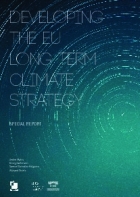Developing the EU long term climate strategy
 Much has changed since the European Commission published in 2011 “The roadmap for moving to a competitive, low carbon economy in 2050.” The Paris Agreement created a new global framework to address climate change, and many of the assumptions—including technological and scientific ones— on which the 2050 roadmap was built have changed. In March 2018, the European Council invited “the Commission to present by the first quarter of 2019 a proposal for a Strategy for long-term EU greenhouse gas emissions reduction in accordance with the Paris Agreement.” This technical paper accompanies a shorter policy paper, and is the outcome of a year-long effort, which included a series of stakeholder engagements in five EU capitals at the beginning of 2018. It is produced under the project “Developing the EU Long-Term Climate Strategy, ” a joint initiative of Bruegel and the European Roundtable Climate Change and Sustainable Transition (ERCST/ICTSD). The technical paper seeks to explore the choices that need to be made across the main issues that might need to be included in the development of a new EU long-term climate strategy, as well as the analyses of potential trade-offs implied by these choices.
Much has changed since the European Commission published in 2011 “The roadmap for moving to a competitive, low carbon economy in 2050.” The Paris Agreement created a new global framework to address climate change, and many of the assumptions—including technological and scientific ones— on which the 2050 roadmap was built have changed. In March 2018, the European Council invited “the Commission to present by the first quarter of 2019 a proposal for a Strategy for long-term EU greenhouse gas emissions reduction in accordance with the Paris Agreement.” This technical paper accompanies a shorter policy paper, and is the outcome of a year-long effort, which included a series of stakeholder engagements in five EU capitals at the beginning of 2018. It is produced under the project “Developing the EU Long-Term Climate Strategy, ” a joint initiative of Bruegel and the European Roundtable Climate Change and Sustainable Transition (ERCST/ICTSD). The technical paper seeks to explore the choices that need to be made across the main issues that might need to be included in the development of a new EU long-term climate strategy, as well as the analyses of potential trade-offs implied by these choices.
Related Content
- The impact of climate change on education and what to do about it
- The power of cities: harnessing low-carbon urbanization for climate action
- Connecting the dots: mapping references to fossil fuel production in national plans under the UNFCCC for the 2023 Global Stocktake
- Towards policies to prevent antimicrobial resistance
- Long-term energy scenarios and low-emission development strategies: stocktaking and alignment
- Disaster displacement: Nepal country briefing
